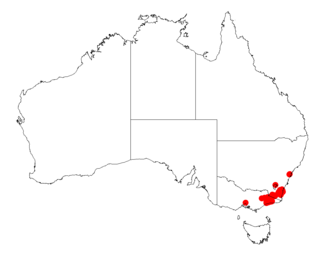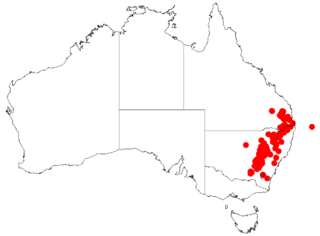
Acacia colei is a perennial bush or tree native to northern Australia and southern Asia. A common name for it is Cole's wattle. Acacia colei blooms from May through September and the flowers are bright yellow.

Acacia podalyriifolia is a perennial tree which is fast-growing and widely cultivated. It is native to Australia but is also naturalised in Malaysia, Africa, India and South America. Its uses include environmental management and it is also used as an ornamental tree. It is very closely related to Acacia uncifera. It grows to about 5 m in height and about the same in total width. It blooms during winter.

Acacia deanei is a tree native to Australia, which is useful for controlling soil erosion. There are two subspecies: Acacia deanei subsp. deanei and Acacia deanei subsp. paucijuga.

Acacia neriifolia, also known as the oleander wattle, silver wattle or pechy wattle, is a tree in the genus Acacia native to north eastern Australia. It is common in the Moonbi Ranges.

Acacia linifolia, known colloquially as white wattle, or flax wattle, is a species of Acacia native to eastern Australia.

Acacia fauntleroyi is a shrub or small tree belonging to the genus Acacia and the subgenus Juliflorae that is endemic to a part of south western Australia.

Acacia gloeotricha is a shrub belonging to the genus Acacia and the subgenus Juliflorae that is endemic to north western Australia.

Acacia hamersleyensis, also known as Karijini wattle or Hamersley Range wattle, is a tree or shrub belonging to the genus Acacia and the subgenus Juliflorae. It is endemic to a small area in central Western Australia.

Acacia latior is a shrub belonging to the genus Acacia and the subgenus Juliflorae that is endemic to western Australia.

Acacia silvestris, commonly known the Bodalla silver wattle, is a tree of the genus Acacia and the subgenus Botrycephalae. It is native to an area in south eastern New South Wales and coastal Victoria.

Acacia polybotrya, commonly known the western silver wattle or the hairy feather wattle, is a shrub of the genus Acacia and the subgenus Botrycephalae. It is native to an area in New South Wales and Queensland.

Acacia oshanesii, commonly known as corkwood wattle and irish wattle, is a species of Acacia native to eastern Australia.

Acacia parvipinnula, commonly known as silver-stemmed wattle, is a species of Acacia native to eastern Australia.

Acacia leucoclada, commonly known as the northern silver wattle, is a species of Acacia native to eastern Australia.

Acacia chrysotricha, commonly known as the Newry golden wattle or the Bellinger River wattle, is a species of Acacia native to eastern Australia. The species was listed as endangered in 2012 with the International Union for Conservation of Nature and Natural Resources.

Acacia kulnurensis, commonly known as the Kulnura wattle, is a species of Acacia native to eastern Australia.

Acacia loroloba, commonly known as the Ma Ma Creek wattle, is a species of Acacia native to eastern Australia.

Acacia pilligaensis, commonly known as Pillaga wattle or pinbush wattle, is a tree or shrub belonging to the genus Acacia and the subgenus Phyllodineae native to eastern Australia.

Acacia torringtonensis is a shrub belonging to the genus Acacia and the subgenus Phyllodineae native to eastern Australia.

Acacia mariae, commonly known as golden-top wattle or crowned wattle, is a species of wattle native to central New South Wales.




















